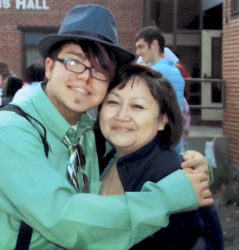
Steven Beyer wanted to take care of his mother, who was diagnosed with terminal cancer and referred for hospice care. He could not because Ascension Health and its hospice center refused to provide effective communication to him.
The National Association of the Deaf (NAD), Stein & Vargas, and Iglesia Martell Law Firm represent Mr. Beyer in his lawsuit against Ascension Health. The lawsuit also names the hospital’s subsidiaries including: Ascension Michigan, Ascension Providence Hospital, and Ascension Clinton Township Reverence Home Health and Hospice care.
The lawsuit alleges that the defendants violated the Rehabilitation Act of 1973 and the Michigan Persons with Disabilities Civil Rights Act of 1976. These laws require hospitals and hospice workers to ensure effective communication with deaf and hard of hearing individuals.
In January 2020, Mr. Beyer took his mother to the emergency room where she was subsequently diagnosed with terminal cancer, and referred for hospice care. During this heartbreaking stay at Ascension Providence Hospital, Mr. Beyer requested sign language interpreters to be able to communicate with the doctors and nurses. The hospital refused to provide on-site interpreters and only used on occasion Video Remote Interpreting (VRI) services that malfunctioned.
Mr. Beyer again asked for interpreters when his mother was transferred to Mr. Beyer’s home for hospice care. Defendants refused the request even though hospice care requires educating the caregiver on how to: perform caregiving tasks, use medical equipment safely, and administer medicine. Hospice care workers are also expected to provide support services and counseling for the caregiver in preparation for the passing of the loved one.
Without interpreters, Mr. Beyer could not communicate with his mother’s health care providers and hospice staff regarding her care, treatment, and prognosis. Mr. Beyer could not participate in the decision-making process regarding his mother’s care. He also could not learn how to care for his mother, understand what to expect, and receive counseling support.
The defendants’ refusal to provide on-site qualified interpreters denied Mr. Beyer access to information about his mother’s illness and access to counseling support during an exceptionally difficult time as he grieved the loss of his mother.
“Losing my mother was very hard for me, but it was made much worse by being ignored by the hospital and hospice staff when I was trying to make sure my mother was comfortable in her last days,” said Mr. Beyer. “Their refusal to make sure I understood everything made it impossible for me to spend quality time with my mother and for me to come to terms with her passing. I want to make sure no other deaf person experiences the terrible tragedy I had to endure.”
Howard A. Rosenblum, NAD CEO, added that “As we deal with a pandemic, it is important that no hospital or hospice neglects the needs of families who need hospice care including those who are deaf or hard of hearing. All hospitals and hospice centers should be prepared for lawsuits if they do not provide qualified interpreters, and are strongly advised to provide them on-site to avoid technological glitches.”
VIDEO TRANSCRIPT: A lawsuit has been filed against Ascension Hospital and its system on behalf of Steven Beyer, a deaf man, who was denied interpreters during hospital and hospice services for his hearing mother who was dying of terminal cancer. Mr. Beyer asked Ascension Hospital for communication access to discuss his mother’s medical services as well as hospice care. Ascension Hospital refused to provide in-person interpreters and only provided Video Remote Interpreting (VRI) occasionally and even then, the VRI connection was terrible or very blurry. After experiencing lack of effective communication through VRI, Mr. Beyer asked Ascension Hospital for in-person interpreters and they refused. The NAD, along with two other law firms: Stein & Vargas and Iglesia Martell, are representing Mr. Beyer in this lawsuit. Hospice services are an important part of the health system. When hospitals aren’t able to treat a patient who is dying, they often refer them to hospice care to try to make patients comfortable as they die. Sometimes, hospice care allows patients to receive their care at a hospice center or at the comfort of their own home, surrounded by family, loved ones, and partners. This way they can be with the patient before they pass away. However, providing hospice care requires training, information, and support from the hospital and hospice staff. Training includes how to perform caregiving tasks such as how to help patients use the restroom or give them a bath, provide proper medication with the right amount of dosage, and use medical equipment. Such training requires communicating effectively to ensure people understand what they need to do to provide care otherwise they aren’t sure they’re doing the right thing. The hospice staff is also supposed to provide support services as well as grief counseling for those providing care to their loved ones who are dying. Because the hospital and hospice refused interpreters, Mr. Beyer could not communicate with hospital and hospice staff and he could not understand how to provide the care his mother needed. Mr. Beyer struggled to provide appropriate care for his mother, who eventually passed away. He should have at least had an easier time to receive the training and be able to grieve like other hearing families. We hope that this lawsuit will ensure that other hospitals that provide hospice services understand the importance of communication access for all patients and family and loved ones, including those who are deaf, hard of hearing, late-deafened, DeafBlind, or deaf with other disabilities. Thank you.
